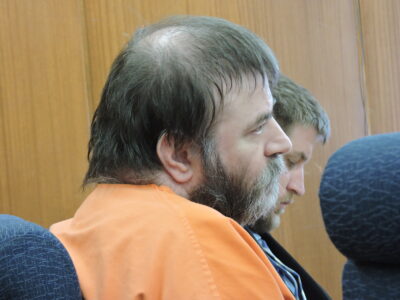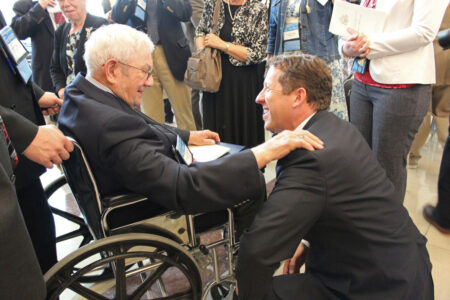Timeline of Sexual Crimes for Kovalski Trial Under Debate During Pre-Trial Hearing

|Photo by Emma Delk| Michael Kovalski is accused of 15 sexual crimes based upon five acts of sexual misconduct.
A pre-trial conference for Michael Kovalski, who is accused of 15 crimes based upon five acts of sexual misconduct, was held to determine details for the trial, including what will be included in Kovalski’s indictment.
Ohio County Circuit Judge Michael Olejasz will oversee the trial, which is set to begin on Dec. 9.
Kovalski is accused of 15 crimes related to five acts of sexual misconduct and sexual abuse by a parent, guardian or custodian. Each act of sexual misconduct comes with two additional discrete charges, totaling 15 crimes.
Ohio County prosecuting attorney-elect Shawn Turak said the first of the two discrete charges was based on West Virginia Code §61-8D-5, which specifies any act of sexual misconduct or sexual abuse by a parent, guardian or custodian as a separate crime. The other discrete charge results from Kovalski committing the crime of incest during the five acts of sexual misconduct.
At the pre-trial conference, Shayne Welling, 1st Judicial Circuit Chief Public Defender, argued Kovalski should not go to trial with counts one through three tried separately from counts four through 15 due to the set of dates proposed by the state for when counts one through three occurred “overlapping” with the set of dates proposed by the state for when counts four through 15 occurred.
According to Turak, counts one through three are crimes alleged to have been committed against the victim when they were under the age of 12. The other remaining counts in the indictment, four through 15, are alleged to have occurred during the time that the victim lived in West Virginia from April 3 through Dec. 15 but do not reference a specific age, meaning the victim was not alleged to have been under the age of 12 at the time counts four through 15 were committed.
Turak said the difference between counts one through three is that the sexual crimes occurred before the victim turned 12, from April 3 to June 29, which is why the distinction between the dates was made.
“Everything, the entirety of the timeframe, is when they lived in Ohio County, West Virginia, before the victim made a report of abuse on Dec. 15,” Turak said. “That’s a very well-said defined date. There are five very discrete acts, and the first three are before their 12th birthday.”
Welling said counts four through 15 should instead be counted as taking place June 30 to Dec. 15. He specified certain counts denoted the same sexual crimes taking place in the overlap of the timelines, meaning there was no way to “factually distinguish” them from each other.
“There is an overlapping date, and I don’t know how the state can claim to the court that there’s no overlapping date,” Welling said. “One set of dates subsumes the other set.”
Welling said these overlapping dates create “a risk” that Kovalski will be denied the ability to file a double jeopardy claim or assert acquittal as a defense.
“He [Kovalski] would have to [assert acquittal as a defense] unless they’re [the state] prepared to ask the jury to make specific findings as to the dates of the event, which the state hasn’t even been able to offer,” Welling said. “I don’t see any way he can go to trial on counts one through three separately from four through 15. They should have been separate on dates.
There is an overlapping date period, and because of that, I think the state has created a sufficiency and a double jeopardy issue.”
Turak countered that an overlap in the date range of crimes was “sufficient” per state law for crimes involving children.
“Children cannot expect to be given a specific date,” Turak said. “In this case, the child will testify, ‘When it happened, I was ‘x’ number of years old.’ In the case of counts one through three, when we ask them if they were 11 or 12 when it happened, they will able to say how old they were.”
Turak added that the timeline for the five crimes tracks the starting offense date of April 3 of last year through the date of disclosure, Dec. 15 of last year.
The defense also requested to use medical records, specifically pediatric or adolescent records, for appointments that took place “once, possibly twice” during the period the indictment covers, according to Welling.
“What I’m specifically looking for is that they [the victim] did not make any disclosures to a medical professional in a private setting of a medical facility,” Welling said.
Turak opposed the motion, arguing that since a doctor is a mandatory reporter, she said it would be “reasonable to conclude” the records “may not contain any such disclosure.”
“These are private medical records,” Turak said. “I don’t know what they contain. I think it’s permissible for the defense to call the doctor and say, ‘Did you ever report any sexual abuse reported to you by your patients?’ Beyond that, I think reviewing (their) private medical records is not relevant.”
Olejasz ordered the production of the medical records, outlining whether the records “contain certain admissions, physical evidence or references of physical evidence of sexual crime against a child and whether or not even the absence thereof was relevant.”
The defendant also made a motion to use supplemental pre-trial jury questioning. Welling said in past sexual misconduct and sexual abuse cases he had worked on, the “honest and candid” responses he received occurred when jurors completed supplemental pre-trial jury questioning, which he believed led to a “fair and impartial jury.”
“When you bring 40 or 60 people in a room, even with the idea of bringing them back into the chambers, people are reluctant to share the most intimate belied systems they have or quite possibly even prior victimization with themselves of their families,” Welling said. “I think you do get a more honest and fair result from the perspective juror poll that allows you to sit back and analyze the idea rather than them being hit with questions and having to answer on the spot.”
Turak countered during the Niyahjah Hales murder trial in that occured in July this year, the jury could have been seated “just as efficiently” if the entire day had not been “spent on a questionnaire.” Tuak added that with the trial on the horizon, giving out questionnaires at the “late hour” of the pre-trial was “a problem.”
Turak added she was “concerned” that some of the questions Welling requested to put on the questionnaire, including “Are sex crimes against children bad?” were not relevant to the case.
“Of course people are going to say they [sex crimes] are bad, but we’re here because Mr. Kovalski is presumed innocent,” Turak said. “That’s relevant for this court if he’s convicted, but what’s relevant for picking a jury is the question, ‘Do you understand he’s [Kovalski] an innocent man as he sits here today?'”
Olejasz said if the court were to grant Welling’s request and grant the use of a pre-trial supplemental pre-trial questionnaire, Kovalski would need to understand it would “certainly necessitate” a continuance of the trial.
“If the court is going to allow it [the questionnaire], we would then have to come back and go through it question by question or ask the parties to submit a questionnaire that they can agree on,” Olejasz said. “Then we would go through [the questionnaire] and argue for additional deletions of certain questions.”





